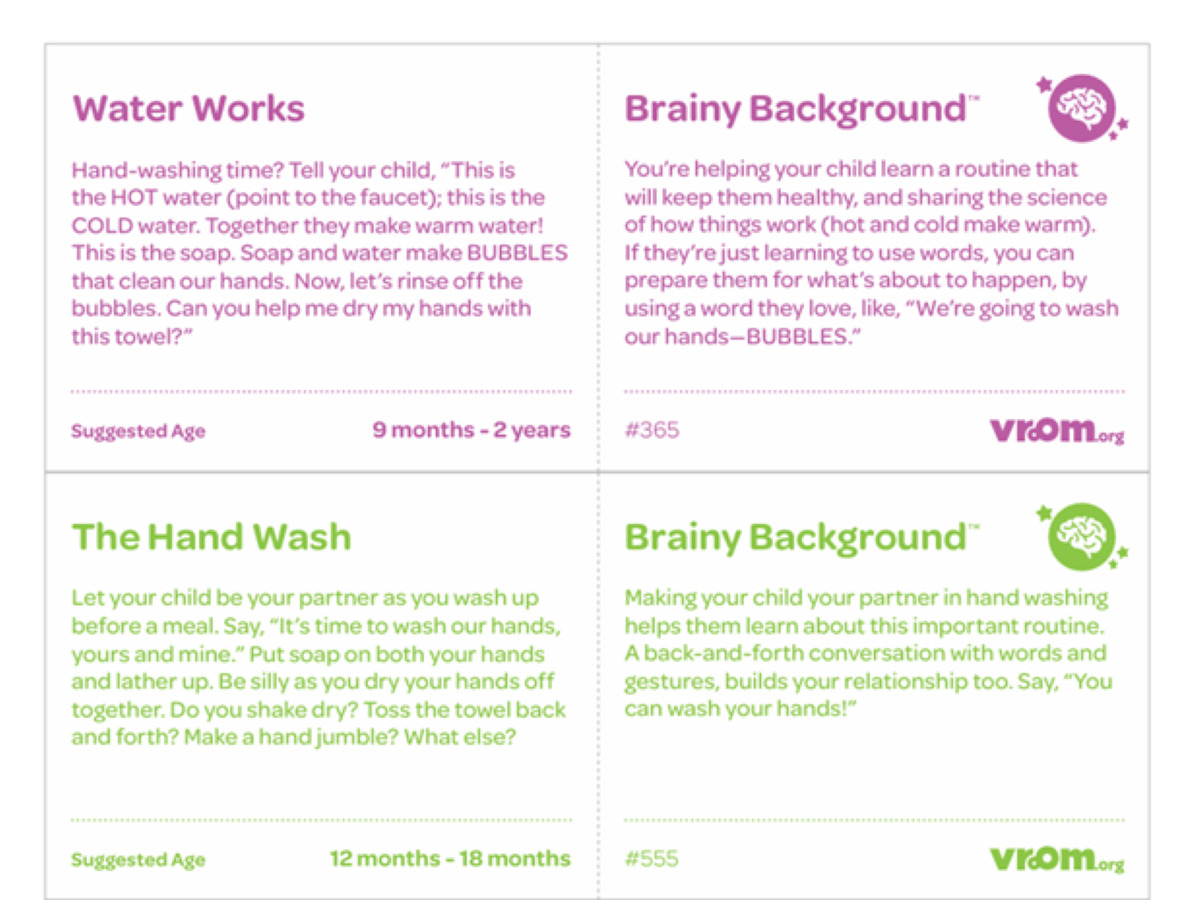Healthy Habits: Brain Builders
Vroom
May 20, 2025

Parents and caregivers do a lot to help child stay healthy! At mealtime, they choose foods to help them grow strong. At bedtime, they teach them how baths keep us clean. And don’t forget every time they brush their teeth, wash their hands, or move their body.
Did you know these healthy habits help their brain grow flexible and strong, too? The skills they learn from the time you spend together don’t wash down the drain. They last a lifetime! Discover brain builders from our partners at Vroom.
Water Works
Suggested Age: 9 months – 2 months
Hand-washing time? Tell your child, “This is the HOT water (point to the faucet); this is the COLD water. Together they make warm water! This is the soap. Soap and water make BUBBLES that clean our hands. Now, let’s rinse off the bubbles. Can you help me dry my hands with this towel?”
Mini Chef
Suggested Age: 3 – 5 years
Have your child help with safe and simple tasks while you are cooking. Mixing or adding an ingredient can be good places to start. As you work, ask them what they think will happen when they stir things together or add something new. Listen to their ideas, then talk together about what you see happening.
Soothing Rhymes
Suggested Age: 0 – 12 months
When your child seems fussy, try singing a rhyme or a song. Do they calm down when your voice is quiet, or do they respond to big facial expressions and an enthusiastic voice? Try different rhymes and songs to find their favorites.
Today’s Feelings
Suggested Age: 3-5 years
Encourage your child to talk about their day using feeling words like happy, excited, and sad. Ask questions like, “Was there a time when you felt frustrated today?” Ask them to make faces that express these feelings. Share your day too.
Song Traditions
Suggested Age: 0-2 years
There are things we do every day. Sing the same songs at those moments to explain what you’re doing with your child. Examples could be leaving a room, fi nishing eating, or washing hands. What else do you do daily that you could sing about?
Laundry Sort
Suggested Age: 18 months – 2 years
During laundry time, pull out a single sock and see if your child can find a match for it in the laundry basket. Once they get it, let them pull out another sock and you find the match. Talk about the clues you use to find the match.
Tent Time
Suggested Age: 2.5-3 years
Make a tent with your child! Cover two sturdy chairs with a blanket or towel and invite them to come inside. Make it a special place for games like playing “Peekaboo” or bringing special tent toys inside to play with. Name the special place together!
Calm Down Kit
Suggested Age: 2.5-5 years
Use an empty shoebox or other container to make a “Calm Down Kit” with your child. Have your child put special items inside that help them feel secure and relaxed. When they are feeling upset, remind them to use their kit. They even can decorate the box to make it their own.
Lot or Little
Suggested Age: 2.5-3 years
Look at the world around you and call your child’s attention to things you see like people, cars, buildings, or animals. Point to them and ask them, “How many do you see?” A lot or a little?” When they understand the rules of the game, invite them to take the lead. Then take turns!
Seasonal Stroll
Suggested Age: 3-5 years
Walking somewhere today? Talk to your child about the seasons. Is it cold or warm? What clues do you see that tell you what season it is? Snow? Flowers? Colorful Leaves?
Just the Two of Us
Suggested Age: 0- 2 years
In a calm moment together, take the time to look at your child’s face. Point to their nose and say, “your nose.” Then point to your nose and say, “my nose.” Respond to what they do. Do they point too? Do they smile or repeat your words or sounds? Try this with different parts of your face.
For even more brain builders for different age groups, check out Vroom’s Healthy Habits Tip Sheet. It’s also available in Spanish!
